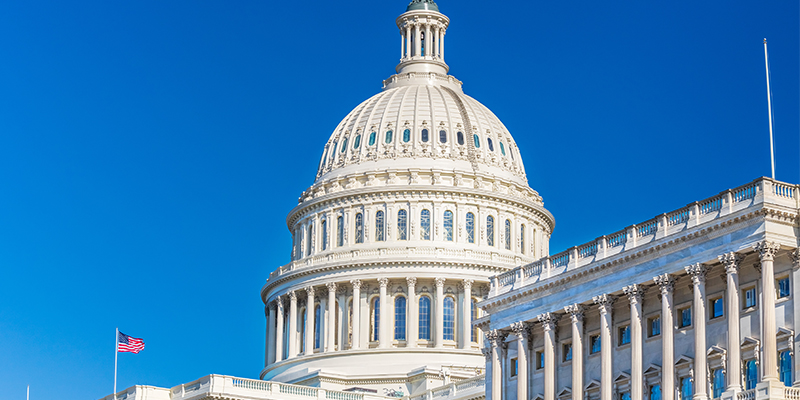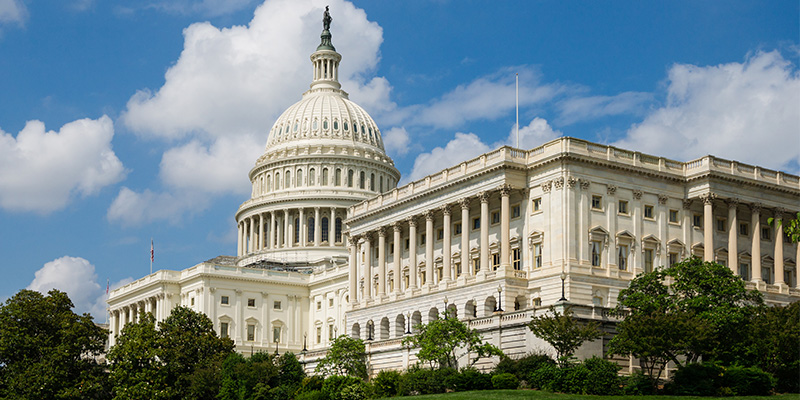The quest to approve federal funding continued during another busy week in Washington, where lawmakers took up a $435 billion funding package that includes the Agriculture and the Food and Drug Administration (FDA), the Department of Justice, the Department of Commerce, the Department of Veterans Affairs, and many more. Congressional appropriators will now focus on the second tranche of funding for additional departments covering areas of defense, financial services and general government, including the Department of Homeland Security and the State Department, all of which will need to be enacted before March 22.
On Tuesday, 16 states and American Samoa held presidential primary elections, with 854 Republican and 1,420 Democratic delegates at stake. While neither President Joe Biden nor former President Donald Trump have attained the necessary delegates to secure their respective party’s nomination, the results from Tuesday appear to further make a repeat of the 2020 race a forgone conclusion. Congressional primary elections were also held on Tuesday in Alabama, Arkansas, California, North Carolina and Texas.
As if this week was not hectic enough, Biden was scheduled to deliver his second State of the Union address on Thursday, formally launching his campaign for reelection by drawing a stark contrast with Trump and Congressional Republicans.
Partisan lines will further harden next week when the White House submits the president’s fiscal year 2025 federal budget request on March 11. While a president’s budget request is generally regarded as a political document, this one should be of special interest to commercial real estate; the revenue proposals Biden is likely to include will provide a peek at what Democrats may propose in next year’s negotiations of tax legislation to replace the expiring provisions that were included in the 2017 law signed by Trump.
If the past budget proposals are any guide, expect the president’s budget to include provisions to cap or eliminate property transfers under IRS Section 1031, raise capital gains rates, and potentially eliminate carried interest. During NAIOP’s CL&LR conference last month in Washington, D.C., NAIOP chapters met with their respective House and Senate offices to explain how these provisions are essential to the long-term health of the industry. These meetings will provide NAIOP with a solid foundation on which to continue to advocate for commercial real estate during the upcoming negotiations for a tax bill and we thank all who participated.
While talk of a government shut down has dominated the news coverage of Capitol Hill lately, there are other issues that we expect to return to the forefront in the coming weeks. Chief among those will be an aid package for Ukraine, Israel and Taiwan. House Democratic Leadership is demanding that House Speaker Mike Johnson take up the $95 billion Senate-passed foreign aid bill approved last month. In addition, Congressman Brian Fitzpatrick (R-PA) and Congressman Jared Golden (D-ME) introduced a scaled-down $66 billion version of the Senate bill with added border security provisions. Of note is that Fitzpatrick has also drafted a discharge petition, which is a legislative tactic that enables a majority of the House to bypass the Speaker and bring a bill directly to the floor for consideration. It would be a highly unusual move for a member of the majority party to file a discharge petition, and a member of Fitzpatrick’s stature initiating such a move highlights how deeply divided House Republicans are on Ukraine funding.
Another matter of importance to commercial real estate is the fate of H.R. 7024, the Tax Relief for American Families and Workers Act. This legislation was written by House Ways and Means Chairman Jason Smith (R-MO) and Senate Finance Chairman Ron Wyden (D-OR). It will temporarily expand the child tax credit, boost the low-income housing tax credit, along with restoring business tax deductions for research and development expenses, bonus depreciation for capital expenditures and restore interest expenses. The bill was approved by the House in January by a vote of 357–70 but is currently held up in the Senate by the Senate Finance Committee Ranking Member Mike Crapo (R-ID), who has concerns with the way the legislation would consider income for eligibility of the child tax credit.
Optimism remains that these outstanding issues can be resolved this spring, but narrow majorities in both the House and the Senate continue to make it difficult to reach consensus. NAIOP’s government affairs team will continue to monitor the process and keep members informed on how developments affect commercial real estate.














